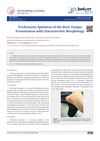 March 2022 in “Journal of clinical case studies reviews & reports”
March 2022 in “Journal of clinical case studies reviews & reports” COVID-19 can cause different skin issues, including rashes and hair loss.
 April 2016 in “Journal of Investigative Dermatology”
April 2016 in “Journal of Investigative Dermatology” The symposium showed that stem cells are key for understanding and treating skin diseases and for developing new skin models and therapies.
 156 citations,
August 2016 in “Journal of controlled release”
156 citations,
August 2016 in “Journal of controlled release” Tight junctions are key for skin protection and controlling what gets absorbed or passes through the skin.
 136 citations,
May 2016 in “Phytotherapy Research”
136 citations,
May 2016 in “Phytotherapy Research” Turmeric may have benefits for skin health, but more research is needed to confirm its effectiveness.
 71 citations,
February 2020 in “Journal of Translational Medicine”
71 citations,
February 2020 in “Journal of Translational Medicine” Progress has been made in skin and nerve regeneration, but more research is needed to improve methods and ensure safety.
 70 citations,
May 2014 in “JAMA Dermatology”
70 citations,
May 2014 in “JAMA Dermatology” The representation of skin conditions in medical reviews partly matches their real-world impact.
 34 citations,
June 2014 in “The BMJ”
34 citations,
June 2014 in “The BMJ” Pregnancy can change skin disease severity, with some conditions improving and others worsening, and treatment should balance benefits and fetal safety.
 21 citations,
January 1988 in “Stress Medicine”
21 citations,
January 1988 in “Stress Medicine” Stress affects skin health and emotional well-being should be considered in skin disease treatment.
 3 citations,
September 2023 in “Frontiers in immunology”
3 citations,
September 2023 in “Frontiers in immunology” Chronic inflammatory skin diseases are caused by disrupted interactions between skin cells and immune cells.
 September 2003 in “Current Paediatrics”
September 2003 in “Current Paediatrics” The document concludes that accurate diagnosis and understanding the type of hair disorder are crucial for treating hair loss in children.
 72 citations,
January 2011 in “Current Pharmaceutical Design”
72 citations,
January 2011 in “Current Pharmaceutical Design” S5αR inhibitors might help treat schizophrenia and other mental disorders but need more research.
 May 2020 in “JOJ Dermatology & Cosmetics”
May 2020 in “JOJ Dermatology & Cosmetics” A rare skin condition usually on the face was found on a man's heel.
 349 citations,
January 2005 in “The FASEB journal”
349 citations,
January 2005 in “The FASEB journal” Human skin can make serotonin and melatonin, which help protect and maintain it.
 17 citations,
February 2012 in “Cutaneous and Ocular Toxicology”
17 citations,
February 2012 in “Cutaneous and Ocular Toxicology” Patients with chronic renal failure on hemodialysis often have skin problems like dry skin, itching, and nail changes.
 5 citations,
August 2015 in “British journal of dermatology/British journal of dermatology, Supplement”
5 citations,
August 2015 in “British journal of dermatology/British journal of dermatology, Supplement” The top research priorities for congenital ichthyosis include long-term side effects of oral retinoids, best topical treatments, and treatments for itch and hair loss.
 3 citations,
April 2016 in “The journal of investigative dermatology/Journal of investigative dermatology”
3 citations,
April 2016 in “The journal of investigative dermatology/Journal of investigative dermatology” Curcumin applied to the skin can start hair growth in mice.
 August 2000 in “Australasian Journal of Dermatology”
August 2000 in “Australasian Journal of Dermatology” The document suggests "Occupational Skin Disease" is a useful standard text, finds "The Clinical Management of Itching" poorly organized, recommends "Atlas of Contact Dermatitis" for its illustrations, and values "Handbook of Diseases of the Hair and Scalp" for its information despite flaws.
 39 citations,
March 2003 in “The Veterinary clinics of North America. Small animal practice/Veterinary clinics of North America. Small animal practice”
39 citations,
March 2003 in “The Veterinary clinics of North America. Small animal practice/Veterinary clinics of North America. Small animal practice” Behavioral dermatology treats skin problems by considering both emotional and physical factors.
 34 citations,
August 2005 in “Dermatologic Clinics”
34 citations,
August 2005 in “Dermatologic Clinics” Stress and emotional factors can worsen skin conditions by affecting the immune system.
 January 2023 in “Acta dermatovenerologica Alpina, Pannonica et Adriatica (Tiskana izd.)”
January 2023 in “Acta dermatovenerologica Alpina, Pannonica et Adriatica (Tiskana izd.)” The article concludes that schoolchildren and adolescents experienced various skin issues during the COVID-19 pandemic, including acne from masks and other skin reactions from the virus and vaccines.
 September 2016 in “Journal of Dermatological Science”
September 2016 in “Journal of Dermatological Science” A gene mutation worsens skin irritation in mice due to a lack of certain fats.
 July 2015 in “British Journal of Dermatology”
July 2015 in “British Journal of Dermatology” Treating skin conditions with both psychological and dermatological care improves patient outcomes and can save costs.
 January 2004 in “Side effects of drugs annual”
January 2004 in “Side effects of drugs annual” Certain skin drugs and topical agents, including some natural extracts and fragrances, can cause allergic reactions. Some hair dyes and extensions, as well as minoxidil, a hair growth treatment, can also cause allergies. Botulinum toxin A can effectively reduce sweat but may have temporary side effects.
 May 1993 in “Current problems in dermatology”
May 1993 in “Current problems in dermatology” Skin symptoms are important for diagnosing infections in children.
 176 citations,
May 2020 in “Dermatologic Therapy”
176 citations,
May 2020 in “Dermatologic Therapy” COVID-19 can cause different skin symptoms that may help with early diagnosis and show how severe the disease is.
 47 citations,
February 2021 in “Pharmacological research”
47 citations,
February 2021 in “Pharmacological research” Exosomes can improve skin health and offer new treatments for skin repair and rejuvenation.
 38 citations,
December 2011 in “Anais Brasileiros de Dermatologia”
38 citations,
December 2011 in “Anais Brasileiros de Dermatologia” Skin diseases significantly lower the quality of life for patients in southern Brazil, especially for younger, single, and lower-income individuals.
 12 citations,
October 2018 in “International Journal of Women's Dermatology”
12 citations,
October 2018 in “International Journal of Women's Dermatology” Hormone therapy in transgender women can affect hair growth and acne, and there are specific skin issues related to gender-affirming surgery, but more research is needed on their dermatological health.
 11 citations,
June 2011 in “Expert Review of Dermatology”
11 citations,
June 2011 in “Expert Review of Dermatology” Skin reactions to drugs are common and can be deadly, usually requiring stopping the drug and may be better prevented with genetic testing in the future.
 10 citations,
July 2008 in “Journal of Cutaneous Pathology”
10 citations,
July 2008 in “Journal of Cutaneous Pathology” Increased mucin in the skin might indicate lupus in patients with hair loss, but more research is needed.






























